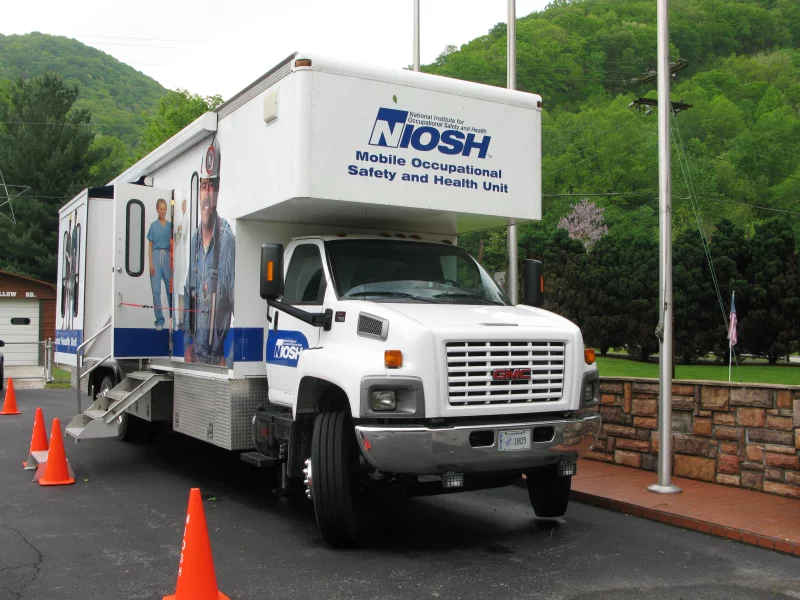This story, written by Yuki Noguchi, was originally published on April 9, 2025 at npr.org. To listen to the audio and see the original story, click here.
Sam Petsonk grew up around southern West Virginia’s mining communities, visiting patients with his father, one of the country’s first doctors to specialize in Black Lung Disease.
“When I was a child, I’d look up and I’d see coal miners — seemingly larger than life, doubled over coughing, scarcely able to walk, work or breathe,” Petsonk says, “I’ve seen it my whole life. I remember it as a kid, and still see it today.”
Today, Petsonk’s whole law practice in Oak Hill, W.Va., exclusively represents coal miners. He often takes cases of people sickened on the job, and he relies on the records gathered by the respiratory health unit of the National Institute for Occupational Safety and Health, a division of the Centers for Disease Control and Prevention that runs the Coal Workers’ Health Surveillance Program. It offers, essentially, a very unique kind of guaranteed workplace healthcare: By law, it gives every miner in the country – roughly 50,000 – access to care for free.
The 25 people working in that unit were put on immediate administrative leave on April 1; they are out of their jobs, along with about 10,000 other federal health workers later this spring.
The lab sent mobile x-ray units to mines to screen miners regularly. It authorized job transfers for miners showing signs of disease. And the unit also trained and certified doctors to read specialized lung scans. Petsonk says that health service has become an essential part of mining life. But President Trump’s sweeping cutbacks at the nation’s health agencies last week included this small team running a program coal miners are entitled to by law.
“It’s a bedrock institution for the medical profession that has been obliterated,” Petsonk says. “It’s just unacceptable.”
The program’s roots date back to a lethal Farmington, W.Va. mining explosion that killed 78 workers in 1968. The disaster led to passage of the Federal Coal Mine and Safety Act, which in turn added the miners’ surveillance program under the respiratory health division at NIOSH.
Lawsuit filed
Late Monday, Petsonk filed a class-action lawsuit against Robert F. Kennedy Jr and the agency he now runs, the U.S. Department of Health and Human Services, to reinstate the respiratory health unit within CDC’s National Institute of Occupational Safety and Health that ran the program epidemiologist Scott Laney calls “the nation’s doctor for coal miners.”
Laney headed research at the coal workers’ surveillance program in Morgantown W.V., until he was placed on administrative leave April 1. Laney says with no staff, the coal worker health surveillance program and its database of x-rays, medical records, and mobile screening vans are abandoned.
He notes that program singlehandedly reduced Black Lung Disease from affecting nearly 40% of longtime coal workers to as low as 2%, around 2000. But in recent years, lung disease for miners has become a major concern again, Laney says, because coal increasingly comes from mines embedded in sandstone, and which generates dust that’s 20 times more damaging to lungs than coal. That means miners are getting sicker, younger — and without the monitoring of coal miners, he says, people will die — and no one will be keeping score.
“It’s going to have impacts on my neighbors; it’s going to be killing young men,” Laney says. “And that story will go untold.”
Last week, Laney and others working in the country’s health agencies were thrown into chaos, amid another round of federal cuts. He and other managers were left trying to find out who among their colleagues remained employed. Laney says with nearly everyone eliminated from his office, it became clear the coal miners’ program could not continue at all.
Trusted by miners
But news of the program’s recent fate has not yet reached the coal miners affected, says Dr. Drew Harris, a pulmonologist and director of the Black Lung Program at Stone Mountain Health, the only such free program in Virginia. He says the coal worker health program is trusted and universally relied upon in these communities.
“In Central Appalachia, it’s a big deal,” he says. “These are towns that basically were built around coal mining, and coal miners are like the heart and soul of this community and economic livelihood for generations.”
Harris says today’s mines are full of sand dust, and he sees patients who, by age 40, need double lung transplants. Black Lung Disease, he says, is not a thing of the past, and surveillance is still needed.
“If that goes away, then, you know, people won’t know that they have Black Lung at an earlier age and more people are going to end up with severe disease because they didn’t diagnose it earlier.”
